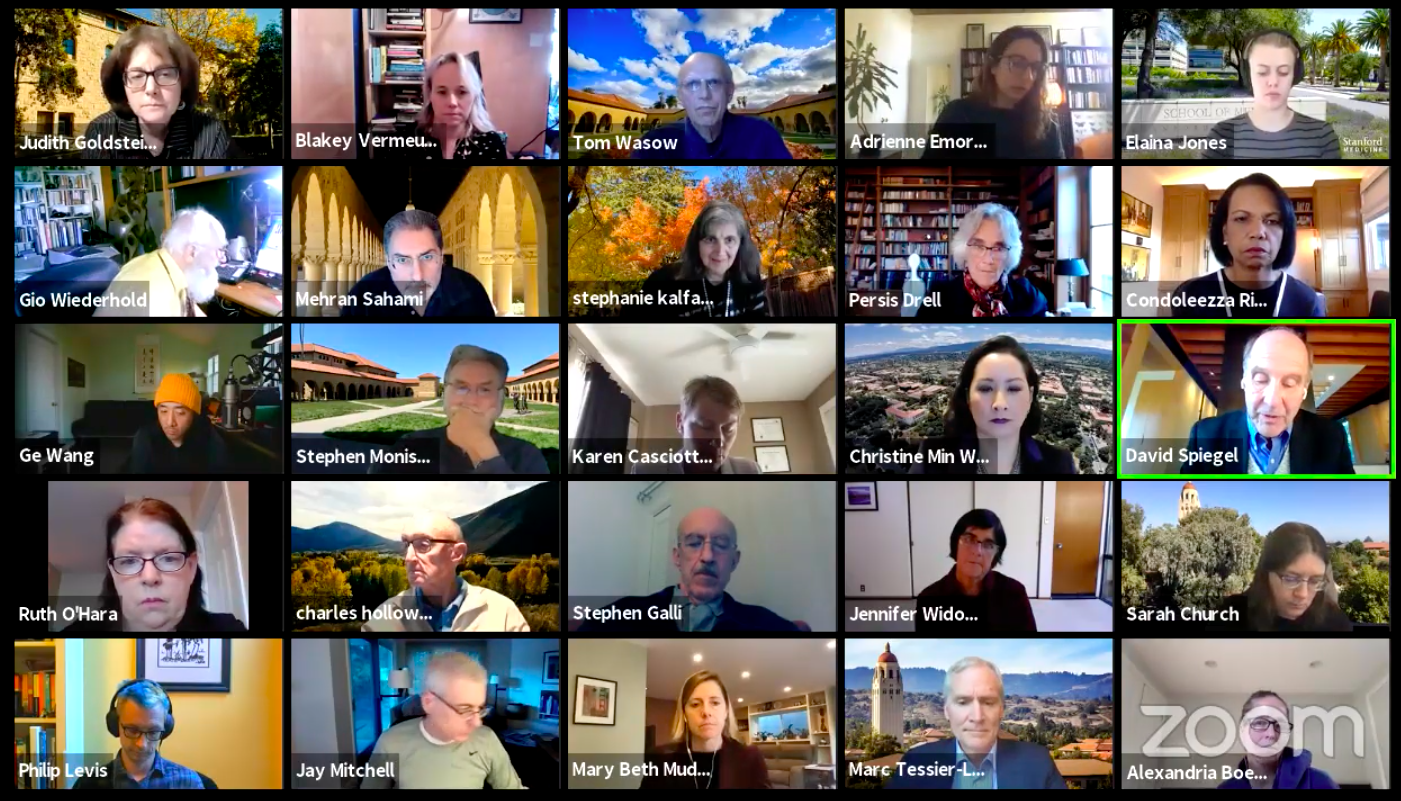The Faculty Senate passed a resolution condemning White House advisor and Hoover Fellow Scott Atlas as well as his recent statements regarding COVID-19 on Thursday afternoon. However, the Senate disagreed over whether it was appropriate to call on the University to investigate Atlas’ actions as possible ethical violations subject to disciplinary action.
The resolution cited Atlas’ discouragement of mask wearing and his Nov. 15 tweets encouraging people in Michigan to “rise up” against Governor Gretchen Whitmer in retaliation against new COVID-19 public health measures, among other issues, as justification for disavowal.
University President Marc Tessier-Lavigne reaffirmed the University’s commitment to freedom of speech while expressing concern with Atlas’ recent actions.
“We also believe that inflammatory remarks of the kind at issue here by someone with the prominence and influence of Dr. Atlas have no place in the context of the current global health emergency, and we’re therefore compelled to distance the University from Dr. Atlas’ views in the strongest possible terms,” Tessier-Lavigne said.
Hoover Institution director and former Secretary of State Condoleezza Rice, also spoke on Atlas’ recent positions on COVID-19.
“His views are inconsistent, in fact, at odds with the course that Hoover is following during the pandemic,” Rice said.
Provost Persis Drell also shared concern over Atlas’ recent actions.
“I would like to say I too am disturbed by Dr. Atlas’ tweets. I’m particularly disturbed by having someone in Dr. Atlas’ position advocating disregard of the recommendation of elected state leaders,” Drell said.
Philip Pizzo, former Dean of the School of Medicine, spoke in favor of the resolution and expressed frustration with the University’s lack of action in regards to Atlas in recent months. Pizzo organized a September open letter, which was signed by over 100 Stanford faculty members, condemning Atlas’ statements.
Pizzo said that the University was not supportive of this effort, even informing those involved that it could not be on Stanford letterhead.
“We’ve heard from colleagues all over the world, expressing their frustration, disappointment and surprise that Stanford was not being more forthright,” said Pizzo.
Psychiatry professor David Spiegel introduced an amendment asking the University administration to investigate sanctions for Atlas, including dismissal. The amendment initially passed with 59% of the vote; however, after the vote, some members expressed concern with the amendment.
“I worry that a Pandora’s Box could be opened, then a precedent could be set, that would involve the Faculty Senate or other members of the academic community expressing their own reasons for initiating or exploring disciplinary action, in cases that I think we might turn out to regret,” political science professor Rob Reich said.
School of Humanities and Sciences Dean Debra Satz added that she thought it was “chilling, and I worry about that.”
As a result of these concerns, biology professor Andrew Fire introduced an amendment to remove Spiegel’s amendment, but this action was determined to be out of order. He then proposed an amendment to remove disciplinary language from Spiegel’s amendment and change a single word in the document. Senate parliamentarian and linguistics professor Tom Wasow approved Fire’s actions, and the amendment passed.
Spiegel said he was “puzzled” regarding disapproval of his original amendment asking for an investigation with possible discipline, since it had originally passed.
“What we are doing is saying, somewhat moderately or very strongly, that we disapprove of Dr. Atlas’ behavior. And I hope we’ll keep that in mind,” Spiegel said.
The resolution without the amendment requiring an investigation into disciplinary language was then voted on and passed with 85% of the vote.
Drell updated the Senate on various COVID-19 issues. She notified the Senate of the new state curfew for purple tier counties, and added that the University will be altering its COVID-19 testing policy. Beginning in January, faculty, staff and postdocs who are working in-person on campus will be required to be tested weekly — students are already required to do so.
According to Drell, the annual Title IX sexual harassment report for the University will be released in the coming days. She acknowledged that case numbers had decreased this year, likely in part due to COVID-19.
“It is totally to be expected, given that we’ve reduced the population on our campus dramatically for the last six months,” Drell said.
Economics professor Caroline Hoxby, chairperson of the Committee on Libraries, proposed an open access policy, where the University would manage a repository of scholarly articles and offer free access. Hoxby said that many peer institutions, including Harvard, are implementing similar programs, adding that the Graduate School of Education has provided open access to their dissertations since 2010.
In practice, Stanford would not own any of these articles, but the University would be able to exercise non-exclusive copyright, meaning that an article in the Stanford repository could also be published in a typical academic journal simultaneously, according to Hoxby. It also calls for the creation of the Office of Scholarly Communications to help implement and run the open access program.
This proposal will apply to Academic Council members and will be considered separately for graduate students and postdocs. Any member of the Academic Council who wishes not to have their article in the repository can submit a waiver.
Some faculty members expressed concerns over the financial implications of an open access policy, both for researchers and journals.
“I have some concerns that people that do scientific publishing do work hard and there needs to be a way to pay people who are editors,” Fire said. “That either comes from us paying fees upfront to publish work, or from fees being paid to read it in the form of subscriptions.” The proposal passed.
“The answer to this ‘why now question’ is that, at the end of the day, what are we doing here as researchers, what we’re doing here, is producing research that we believe has great value for the world, and that should be disseminated as widely as possible,” Hoxby said.
Contact Kirsten Mettler at kmettler ‘at’ stanford.edu.
